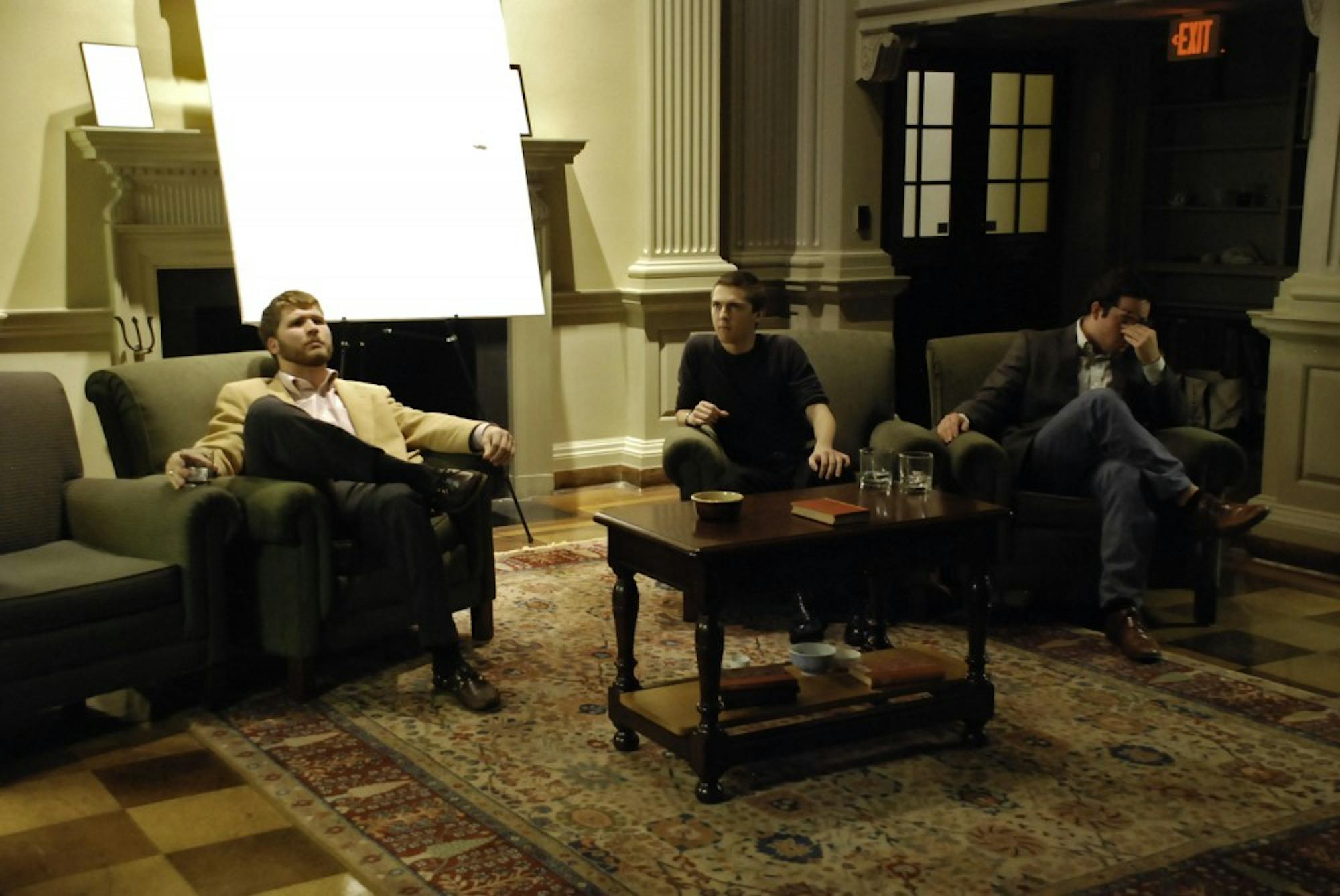How much would you spend on a white painting? $10? $100? What if your best friend spent $200,000 on a monochromatic painting — would you tell him what you thought?
This question is the premise of “Art,” a one-act Tony Award-winning play by Yasmina Reza, which the Displaced Theater Company is producing. Elise Wien ’17 selected and directed the play.
“I think it’s hilarious, and I think it relates some on-campus themes about feeling validated and the underlying foundation of friendship,” Wien said.
The performances will be in three site-specific locations: One Wheelock, Baker Library’s current periodicals room and the Black Visual Arts Center lobby.
Viewers have to seek these spaces out, Wien said.
“They’re not these ‘facetimey,’ visible places,” she said.
The play has three central characters: Marc, Serge and Yvan. The small cast brings the audience close to the dynamics of their longstanding friendships, which are put under increasing pressure. Mike McDavid ’15, Joshua Elwood ’16 and Sam Hefler ’16 needed to create credible relationships among the characters that demonstrated the culmination of building resentments, insecurities and misperceptions.
The actors exchanged dialogue quickly, often referencing the preceding lines of other characters, so that no character was ever at rest on stage. Elwood said that even when his character was off stage, he felt it was important to remain engaged to maintain the play’s energy.
“Within each scene we’re very much relying on each other,” Elwood said. “There’s not a whole lot of time to rest. You’re very much engaged in the acting all the way through. Even if you’re not quite on stage, you’re listening to the characters and you’re, like, staying absorbed, staying in character.”
The play’s comedy depends upon the fast-paced delivery of the quips, and the quick-talking cast in this production worked on pacing to achieve the right effect, Wien said.
“I really appreciated the subtle jabs that each character took at each other,” audience member Speight Carr ’16 said. “I thought it was a really funny show, and I very much enjoyed it.”
Friday’s performance took place in One Wheelock. The comfortable, casual atmosphere gave the impression that one was in a friend’s basement, watching the events unfold between new acquaintances. This impression, furthered by the frequent asides that Serge, Yvan and Marc made to the audience, felt more like intimate confidences than plot devices.
The audience was small, fewer than 20 people, but the actors kept their performances earnest and spirited. The audience paid rapt attention, despite occasional interruptions from outside forces that come in hand with a public performance.
The most comedic moments arose when characters reached their breaking points and exploded. Moments of intense emotion came from insignificant or inconsequential words from the other characters.
Each character served as a protagonist and a foil. The conflict between Serge and Marc, played by Elwood and McDavid, is the play’s most constant struggle. While Serge has found professional success and has become interested in all things contemporary and fashionable, Marc has a general disdain for modernism, preferring the classics.
When Marc finds out his best friend Serge bought a white painting for such a large sum without consulting him, he is outraged and disgusted. Marc sees the painting as a meaningless waste of money, while Serge sees the piece as an evocative example of modern art. Yvan tries to play the middle ground, but is quickly forced by the other two to take a side. The painting catalyzes revelations about their changed relationships, and forces them to reexamine why they spend time together at all.
The actors’ contrasting characteristics helped distinguish their mannerisms and more clearly define their differences. Elwood said that he felt that their differences in size — McDavid is larger than Elwood, who is more slight in frame — as well as tones of voice contributed to their arguments’ comedic moments.
The most striking part of the play was the ending, in which Serge and Marc tested the bounds of their friendship while Yvan looked on in a combination of horror and anticipation. After its climax, the show ended abruptly, with a few asides meant to wrap up the story that were devoid of earlier scenes’ comedy.
The play’s humor, which does not depend on the viewer’s knowledge of modern art, relies heavily on the norms of male friendships, Wein said. It has no female characters, though women are referenced. Wien said that Reza firmly believed that the play’s plot could only work in the context of male friendships.
Wien said that the play forces audience members to “take a perspective” on their own relationships and see if they exist merely for convenience.
The Displaced Theater Company will perform its final showing of “Art” in the lobby of the Black Visual Arts Center on Nov. 14 at 9 p.m.
Carr is a former member of The Dartmouth business staff.
McDavid is a member of The Dartmouth opinion staff.
This article has been revised to reflect the following correction:
Carr is a former member of The Dartmouth business staff, not a current member, as the article indicated originally.




